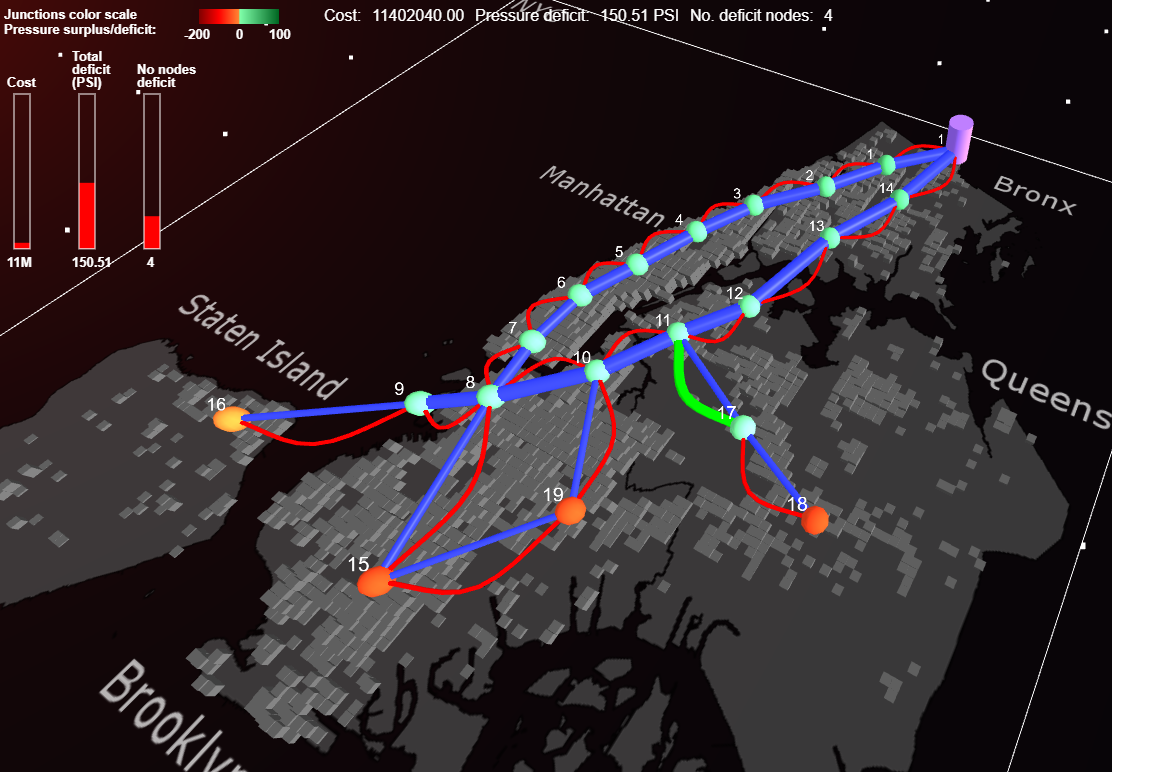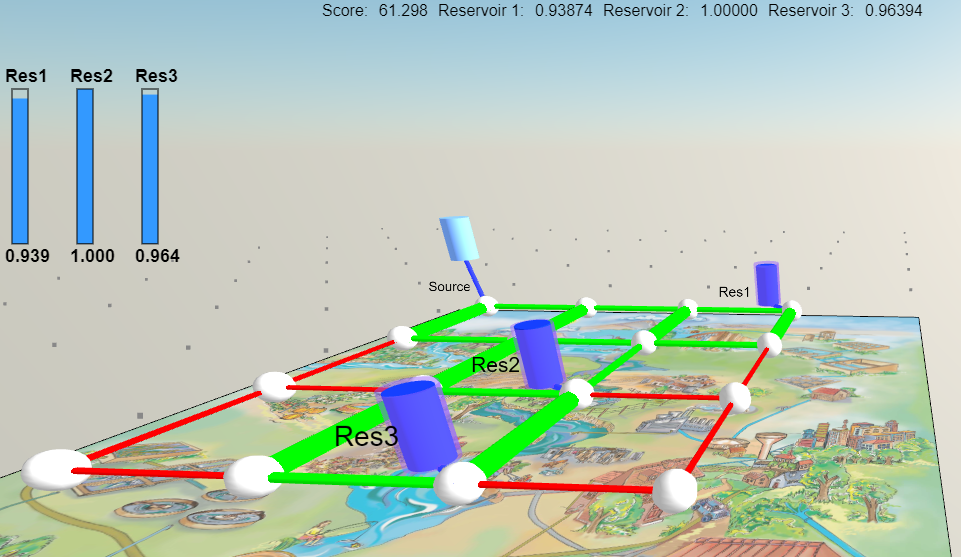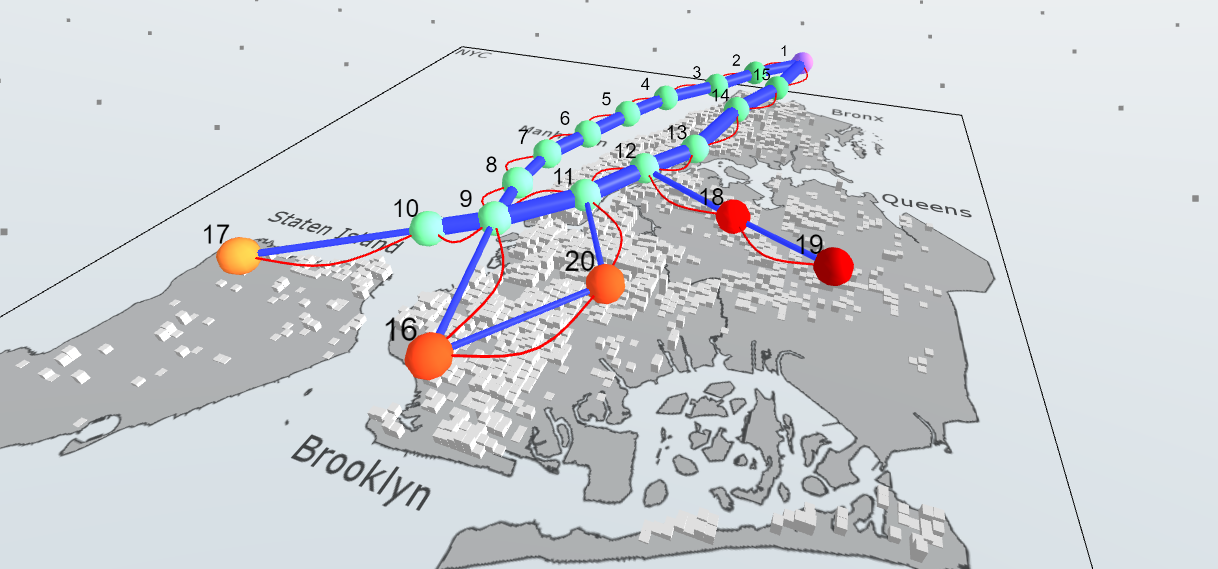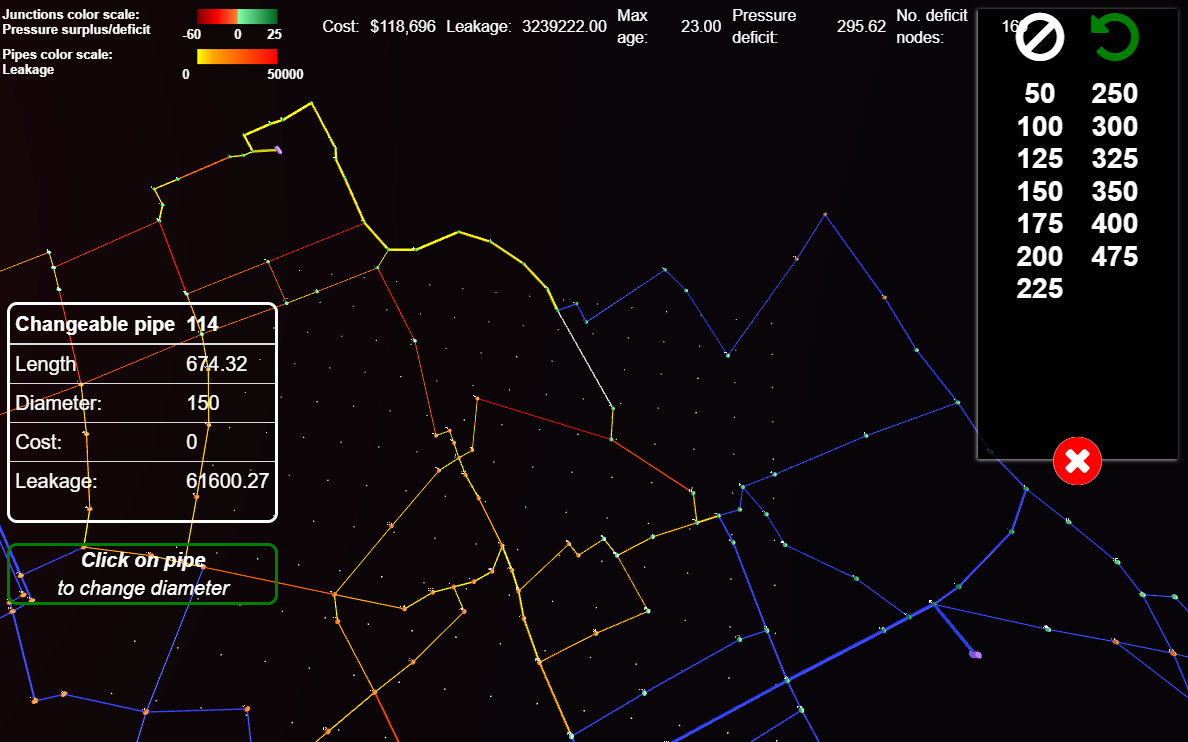
The Nexus Game
The worldwide use of decision games, or often called Serious Games ('games that do not have entertainment as their primary purpose'), is becoming more popular and allows players/stakeholders to experience situations that are impossible in the real world for reasons of safety, cost, time or their rare occurrence. Examples of Serious Gaming applications include domains as diverse as healthcare, public policy, defence, training and education.

In contrast to traditional Game Theory or Operations Research where scenarios or problems are typically well structured, serious gaming can simulate more complex, dynamic, uncertain, socially-coupled scenarios, referred to as "wicked problems" that are prevalent in the real world. Water supply and demand, food production and energy provision and consumption are intimately linked physically, socially and economically, forming the Water-Food-Energy Nexus, an interconnected system that is increasingly a cause for concern due to projected demand growth. Strategic decision making for planning and management of infrastructure supporting the Water-Food-Energy the Nexus is an example of such wicked problems. It can, therefore, benefit from leveraging the technical strengths of simulation models and the social strengths of multi-player/stakeholder engagement in a game execution.
Why serious games?
The Serious Gaming approach offers potentially transformative capabilities to strategic decision-support tools to provide better management of complex infrastructure systems compared to purely technical simulation or optimisation methods that have difficulty in capturing the socio-technical challenges of complex systems. The Nexus Game will simulate the evolution of the Nexus system with player(s) interfering in a system's dynamics through various choice variables/interventions. This represents a paradigm shift not only from the approaches that focus solely on technical issues, but also a shift from policy and regulatory regimes that concentrate on individual Nexus components separately.

1. Research idea and transformative nature of the project

Understanding water and its interdependencies with food, energy and the environment is vital if water is to be managed effectively and efficiently. There is, however, a lack of tools to support long-term decisions related to water infrastructure in a wider context of the water, food and energy (WFE) Nexus and in long term. This project will contribute to better management of the complex WFE system by investigating a Serious Gaming (SG) approach (‘The Nexus Game’) as the basis for developing more effective and timely infrastructure policy and decisions at various spatial (local, regional and national) and temporal scales.
Water supply and demand, food production and energy provision and consumption are intimately linked physically, socially and economically, forming the WFE Nexus, an interconnected system that is increasingly a cause for concern due to projected demand growth. This complex system relies on large physical networks of interrelated infrastructure components to support modern societies. However, the Nexus is also a collaborative system with significant technical and social complexity. Water (and its associated infrastructure systems for drinking water supply and wastewater disposal, irrigation, flood control, coastal protection, etc) is the critical ingredient in this connected system, and thus forms the focus of this project. The worldwide use of decision games, or often called Serious Games ('games that do not have entertainment as their primary purpose'), is becoming more popular and allows players/stakeholders to experience situations that are impossible in the real world for reasons of safety, cost, time or their rare occurrence. Examples of SG applications include domains as diverse as healthcare, public policy, defence, training and education.
In contrast to traditional Game Theory or Operations Research where scenarios or problems are typically well structured, serious gaming can simulate more complex, dynamic, uncertain, socially-coupled scenarios, referred to as “wicked problems” that are prevalent in the real world. Strategic decision making for planning and management of infrastructure supporting the WFE system is an example of such wicked problems. They can, therefore, benefit from leveraging the technical strengths of technical simulation models and the social strengths of multi-player/stakeholder engagement in a game execution. The SG approach offers potentially transformative capabilities to strategic decision-support tools to provide better management of complex infrastructure systems compared to purely technical simulation or optimisation methods that have difficulty in capturing the socio-technical challenges of complex systems. The Nexus Game will simulate the evolution of the WFE system with player(s) interfering in a system's dynamics through various choice variables/interventions. This represents a paradigm shift not only from the approaches that focus solely on technical issues, but also a shift from policy and regulatory regimes that concentrate on individual WFE components separately.
2. Proposed approach

To achieve the above project vision, which is ambitious, multidisciplinary and of a highly strategic nature, the following four research areas will be addressed:
- Infrastructure components and interactions within the WFE Nexus: A detailed causal loop diagram laying out qualitative causal relationships among WFE system components will be developed first. This will form a basis for a System Dynamics model with multiple interacting feedback loops. An example of which is the link between single farm payments, land management and flooding. The focus will be on the importance of interactions and feedback between socio-technical components, their scale and the level of complexity that is appropriate for capturing the major processes and elements that characterise their behaviour.
- A modelling framework to represent structure and behaviour of the Nexus elements: Infrastructure components of the WFE system are realised as large physical networks (e.g., water supply, drainage, energy, transport, etc.), suggesting a graph-theoretic approach for modelling basic structure. This will be implemented through a complexity science approach (e.g., System Dynamics modelling), which enables simulation of non-linear, feedback driven complex dynamic systems.
- Software engineering/informatics aspects of game development and execution: To develop the Nexus Game, a logical framework for gaming and an engine will be required. Both the logical framework and engine will be developed to maximise the use of existing open data, such as maps, rainfall and flow data. Furthermore, as the game will have to be engaging and motivating, interface concepts will be borrowed from successful entertainment games, such as SimCity and Minecraft.
- A programme of SG exercises with a number of participants: The game will be centered on the unique interplay of the infrastructure and the WFE Nexus in the UK and will consist of a number of roles, which include policy makers or government, residents, farmers, businesses, water utilities and city planners. The game will be used not only to analyse infrastructure policy options under conditions of uncertainty, but also for educational purposes. Players’ behaviour during the game could be data-mined to improve the decision making process and the social interaction between the parties. Previously funded projects in the UK and overseas have contributed scientific knowledge and applications in one of the separate WFE Nexus areas, but nothing on the scale that the unconventional approach adopted in this proposal offers has been attempted in the past. Furthermore, this new approach departs from the classical simulation modelling and ‘predictive approaches’ where a model is calibrated, verified and then used for prediction (with or without uncertainty quantification). The approach proposed here involves a complexity science view of modelling where due to interactions of technical and socio-economic components new properties of the system may emerge that could not have been anticipated (e.g.,‘tipping points’, 'bifurcation points', etc). This is a fundamentally different way of approaching uncertainty and risk analysis in socio-technical systems that could pave way to future decisions that will minimise unintended consequences, such as when biofuels impact on water availability and biodiversity or displace food crops.
3. Impacts, outcomes, and risk management

The project will focus on UK water infrastructure and water security within the WFE Nexus (i.e., how it could be achieved; possible future scenarios, threats, synergies, uncertainties; what policy approaches can/should be developed and applied, etc). Thus it would directly address a major societal challenge: how should the UK achieve its basic provisioning of WFE in the future, but with a particular focus on water, a strategic question of great importance to any society. Water security is also vital to future UK economic success and environmental integrity as failure to achieve security could have dire consequences for other sectors. The work is to be completed in two years, ultimately delivering:
- A working prototype of a computer-based Nexus Game platform that can be used for playing the game by at least one player to explore the likely consequences of any decision in the long term, with the potential to be extended to multiplayer capability. Three examples of systems at different scales (from micro to macro) will be developed on the platform, including urban scale (e.g., a town/city), catchment scale (e.g., Somerset Levels), and UK scale.
- A new logical framework which can be extended to different objectives beyond the Nexus management and for various scales (local, regional and national).
- An open-source engine that supports the ongoing development of serious games for environmental management.
- A programme of Serious Game exercises/playing to be undertaken with a number of participants.
4. Difference award will make

The use of Serious Gaming in water engineering and management is in very early stages and requires initial research and development to explore the potential of this exciting approach. This project will deliver a fast turnaround and open this new approach to wider audiences of policy makers, water engineers and other scientists involved in water research and management. This project will also deliver impact nationally (policy-based research) and internationally (by highlighting issues associated with the interdependencies between water, food and energy), which is a key goal of the EPSRC strategic plan. Furthermore, national excellence in simulation and modelling for water engineering applications, with significant international academic impact, will be strengthened because this project combines, uniquely, technical and socio-economic considerations into a single, complexity modelling framework taking account of societies having to adapt national infrastructure for environmental (climate) change. The Principal Investigator will use this project to build on interdisciplinary research he has been conducting at the interface of disciplines that place more emphasis on quantitative rigour (e.g., engineering and computer science) and softer disciplines (e.g., socio-economics), which is normally difficult to get funding for.